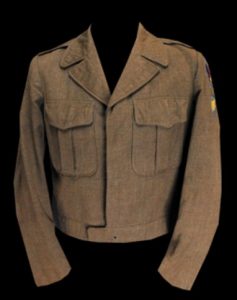I never got an allowance and never asked for one, although I did steal money from my mother’s purse once, thirty cents to buy a pet turtle. I never lacked for anything that was truly necessary. My brother and I mostly wore hand-me-downs from our Uncle George’s youth; Grandma must have saved everything he ever grew out of – in my 3rd-grade class photo I am the only boy wearing knickers. In high school I wore George’s wartime Eisenhower jacket, proudly. Until I got my working papers, which New Jersey requires for anyone under 18 to get a “real” job, money for things I wanted came from doing odd jobs and getting small handouts from my uncles.

Uncle George spent his early career years working for Western Electric, helping build the Mexican telephone system. He was there so long that in his photos he looks Mexican, maybe because of the mustache. During WW II he was a Signal Corps major stationed in New Guinea, fighting the Japanese and taking occasional target practice against stacks of canned Spam .
After the war he returned to Western Electric, picking up his career where he left off. He had a good job and a bit of money, and he owned a grand old house on Park Avenue (the Park Avenue in Orange, not the one in New York) that was divided into several equally grand apartments. His house was three blocks from ours, and sometimes I’d be sent over there on a Saturday morning to get me out of my mother’s hair for a while. Sometimes he would give me a quarter, equivalent to about $2.50 today, for no particular reason. He knew my name, but for some reason always called me Sport. Maybe that’s what he called everybody.
When visiting him, I pretty much kept quiet (he was usually lying on the couch, hung over in a gentlemanly way) while I read through his New Yorker magazines and tried to understand why the tiny cartoons embedded in the text were not funny. I later learned that they were not really ‘cartoons’, but just design elements to break up the text.
On one visit, I had recently read a magazine article about the excellence of Louisville Slugger baseball bats – how the wood was chosen, how carefully they were manufactured for maximum ball flight, etc. etc. Not owning a bat of my own of any brand, I tried to plant in George’s mind the idea of him buying me one. (I have a strange aversion to actually asking people for what I want.) Through the morning, I produced a slow trickle of factual nuggets from the article. Being hung over, he was uninterested in, and unmoved by, my low-key salesmanship. Bad timing on my part.
George had probably heard about my experience helping my father paint a house at the shore, and through my mother he asked whether I’d be interested in a job repainting the decks, railings and stairs of his apartment house. Yes, of course I was interested, and I spent many sunny days that summer working on his house. Aunt Louise kept me in iced tea and sandwiches as I painted my way through several gallons of battleship gray.
George and Louise met and married during the war; she was an officer in the WACs. The grownups in my family didn’t seem to like her very much; she may have been too boisterous for their tastes, similar to how they felt about my Aunt Sweetie, also an ex-WAC and a bit on the rowdy side.
Once all the painting was done, George shook my hand, said “Thanks, Sport!”, and handed me an envelope. When I got home and showed my mother how much was in it, she was astonished. How much did he give me? I don’t remember exactly, but it was a lot.
Uncle Bill, aunt Mabel’s husband, would give me a quarter once in a while too, for no particular reason. We didn’t see Bill and Mabel very often until Grandma started showing her age and went to live with them; then the two families would trade her off on weekends, with Bill driving back and forth from their house in Livingston. I especially enjoyed the drive back down the mountain; coming down Northfield Avenue at night there was, and still is, a spectacular view of Manhattan, stretched out and sparkling 15 miles away.
Bill was a production foreman at the Ford plant in Mahwah. He was not Italian, but I came to think of him as a gavone, a word I picked up from my neighborhood friends, defined as:
Cafone (also caffone, gavone)
Noun
1 A labourer; a peasant, especially one who is Italian or of Italian descent.
2 slang Especially in Italian-American usage: a coarse-mannered person; a low-life, a lout. – Lexico
That opinion was solidified when he came into our kitchen once after bringing Grandma home, hawked up a big one, and spat into the sink. I was offended, and without thinking gave him the stink eye. He responded with a sneer and after that, the Uncle Bill revenue stream dried up.
